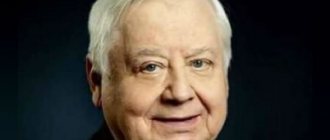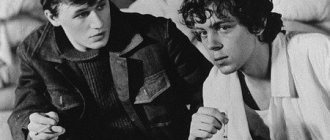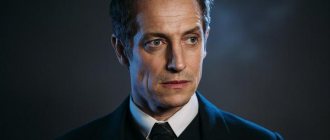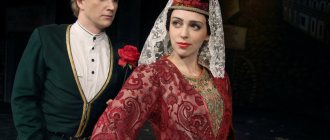Biography of Oleg Menshikov
Oleg Evgenievich Menshikov is one of the most unpredictable and “closed” actors, whose performance leaves no one indifferent. He was glorified by the role of Kostya from the Soviet musical drama “Pokrovsky Gates”.
Actor Oleg Menshikov
Viewers remember him for his roles as Baron de Sigognac from “Captain Fracassa”, Sinitsyn from the melodrama “My Favorite Clown”, NKVD soldier Mitya from “Burnt by the Sun” and Ensign Sanya from “Prisoner of the Caucasus”. Ostap Bender, Doctor Zhivago, Erast Fandorin... What other star roles were there in Menshikov’s filmography and what was the actor’s path to fame?
Childhood
Oleg Menshikov does not like to give interviews, so we know little about his childhood. He was born in Serpukhov near Moscow on November 8, 1960. The actor’s father was a military engineer, and his mother worked as a neurologist.
Childhood photo of Oleg Menshikov
After the birth of their son, the family was given a “Khrushchev” apartment not far from Kashirskoye Highway. Here, in the south of the capital, in the Kolomenskoye area, the actor spent his childhood and early youth. In 1967, he went to the first grade of secondary school No. 866, where he diligently sat at the desks for all 10 years. He studied well, was not an excellent student, but his heightened pride could not allow him to get C grades. At the same time, he attended music school (violin class).
The actor’s classmate Maria Koposova recalled that from the first years of study, all the girls in the class were madly in love with Oleg. He was handsome, polite, witty and always neat, and could surprise you with some kind of musical improvisation. At the same time, he was very touchy and, although he treated everyone with sympathy, he behaved with restraint. For example, when in elementary school a girl was placed at his desk, he drew a line in the middle with chalk and made sure that the neighbor did not cross it.
Already at school, Oleg Menshikov was popular with women
Oleg Menshikov's passion at school was operetta. He went to performances at the Operetta Theater twice a week. He watched The Count of Luxembourg and Maritza several times. His passion for operetta led to Oleg beginning to stage plays in his senior year. He made a play for the New Year, where he included excerpts from his favorite operettas. And he combined his favorite performances with his own literary opuses and music. ,
Student years
Menshikov's talent as an actor was noticed in the ninth grade.
Together with his parents, the young man came to the wedding of a girl whose mother was a costume designer at the Maly Theater. At the celebration, it was as if he turned into a man-orchestra: he played the piano and accompanied the dancers and singers. Among the guests was Vladimir Monakhov, a teacher at the Shchepkin Higher Theater School. He constantly watched the boy, and at the end of the evening he invited Oleg to audition. Menshikov introduced Alexander Pushkin’s “Desires of Glory” to the teacher. “Of course, it was imperfect, and where does perfection come from at his age? But the main thing was that in these minutes I saw how Oleg himself became a poet. I realized that he was gifted as an actor. And exceptionally gifted. He reminded me of Gerard Philip, the great romantic, the prince of the French stage and screen...” recalled Monakhov.
Young Oleg Menshikov
When Menshikov received his school certificate in 1977, the question “Who should I be?” didn't stand in front of him. He submitted documents to Shchepka and got in on the first try. He was enrolled in the course of the school rector, Nikolai Afonin. Attention was drawn to the talented boy from the first year. Oleg and his classmates constantly created various humorous acts, and the student skits with Menshikov at the school were remembered for many years. The young actor’s subtle humor and observation skills helped bring funny events from the life of the university to life on stage.
During his senior year, Oleg Menshikov played in the play “Invasion,” directed by Nikolai Agafonov. Moreover, the main role was written specifically for Oleg, but he himself asked to play a secondary character. “He played a swaggering, stupid, self-confident officer with secret irony, and very accurately according to the drawing,” recalled the director of the play. “As a result, Oleg created a masterpiece. Even then I was not afraid of this word, noting his work, and now I boldly repeat it. The whole school came running to see Menshikov in the role of Werner, it was so interesting to watch him.”
Menshikov on the stage of the Soviet Army Theater (Ganya Ivolgin, “The Idiot”)
After graduating from the theater in 1981, Menshikov went to serve at the Maly Theater, and a year later he moved to the Soviet Army Theater.
First film roles
Oleg Menshikov's film debut came in 1980. He played Shurka from the drama “I Wait and Hope” by Suren Shahbazyan. During the filming of this film, Oleg’s talent was noticed by director Roman Balayan. At Suren’s request, he watched the footage, was terribly dissatisfied with Menshikov’s performance and almost persuaded the director to change the actor, but before that he decided to visit Menshikov himself in the dressing room.
“Waiting and Hope”: Oleg Menshikov’s first film role
“I see some young man sitting there, playing the guitar, singing and dancing. He did this, it should be noted, wonderfully,” recalled Balayan, amazed at the difference between Menshikov “in dynamics” and how he turned out on film. - It was just taken off unsuccessfully. This is what happens in the movies. What would have happened if I hadn’t seen him in the dressing room?”
Menshikov's film debut could be his last film role
10 days after the start of filming “Waiting and Hope,” Nikita Mikhalkov called Balayan and asked him to send him Menshikov for filming in the film “Kinfolk” with Nonna Mordyukova and Svetlana Kryuchkova.
“Rodnya” is the first work experience of Menshikov and Mikhalkov
The next role of Oleg Menshikov was Sergei Sinitsyn from the drama about the midlife crisis “Flights in Dreams and in Reality” by Roman Balayan. Initially, his character was vaguely written in the script, but was later enlarged - he smartly courted the girl Alice (Elena Kostina) and put the main character (Oleg Yankovsky) in love with her on his shoulder blades.
Oleg Yankovsky and Oleg Menshikov (“Flying in dreams and in reality”)
"The Pokrovsky Gate"
Mikhail Kozakov has almost confirmed the cast of the melodrama “Pokrovsky Gate”, which tells about the life of such dissimilar people within the same communal apartment. A poet and connoisseur of female beauty, Velurov (Leonid Bronevoy), and a melancholy intellectual Ravikovich (Lev Khobotov) were found, but Kostik Kozakov did not find anyone to play the role of the young “player of life” Kostik.
“Pokrovsky Gate”: Oleg Menshikov as Kostya
He had already tested a dozen and a half actors, but no one was suitable. Kozakov was already in despair when his wife came to his aid, having accidentally seen on TV the first film with Menshikov, “Waiting and Hope.” She liked the young actor, she wrote down his name and recommended it to her husband. And as soon as Oleg appeared on the set, it became clear to everyone that this was the same Kostya. Oleg Menshikov about the film “Pokrovsky Gates” It is interesting that at this time Menshikov was approved for a role in the film “Private Life” by Yuli Raizman, but the directors agreed that Menshikov would still remain in “Pokrovsky Gates”.
The film was based on the play of the same name by Leonid Zorin - an autobiographical play, but even the most meticulous viewer did not find a single gap between the author and Menshikov’s hero. For a long time after the premiere, Oleg was perceived exclusively as Kostya, personifying the carefree spirit of youth. And today this image is considered by many to be one of the most successful in Menshikov’s filmography.
Menshikov's first star role
After the first triumph, the directors began vying with each other to call Menshikov to their place. In the 80s, the actor played the most diverse roles: he was a romantic hero in the film “Captain Fracasses”, and an absent-minded red tape in the film “Big Volodya and Little Volodya”, and a naval officer in the film “Moonzund”.
Still from the film "Captain Fracasses"
His theatrical career was also successful at this time. Menshikov played one of the most notable roles - Ganechka in “The Idiot”, in 1985 he left the Soviet Army Theater, then worked at the Ermolova Theater, where he moved together with Tatyana Dogileva and Alexander Baluev.
Oleg Menshikov was never afraid of difficult material, but his spirit was broken by the theater director Valery Fokin. Soon after troubles with the production of Nabokov’s “Invitation to an Execution” (Menshikov, eager to play Cincinnatus, refused the role of Pierre and ultimately did not participate in the play at all), the actor left the theater and broke off relations with his former colleagues. Later he moved to the theater. Mossovet, where he was involved in the production of “Caligula” (1990).
Filmography of Menshikov
Oleg Menshikov’s first film was “Waiting and Hope,” in which he played a minor role.
However, his performance turned out to be so bright that he soon received an offer to star in “Pokrovsky Gates,” which became the starting point in his biography.
In this film, Menshikov played the extraordinary student Kostya. It was this work that brought him enormous popularity and universal love of the Soviet audience.
After that, he began to receive many offers from different directors.
He later starred in such famous films as “Captain Fracasse” and “Moonzund”. It is interesting that Oleg managed to masterfully play absolutely any characters, regardless of the genre of the film and the complexity of the role.
In the early 90s, there were so many offers to act in films that he could already choose what to agree to. Every appearance of Menshikov in one film or another guaranteed her success.
For example, the film with his participation “Burnt by the Sun” (1994), Nikita Mikhalkov, was awarded an Oscar. In it, the actor played NKVD officer Mitya.
Oleg Menshikov's performance in this film received a lot of positive reviews from world-famous critics.
Then Menshikov took part in the filming of “The Barber of Siberia” and “Prisoner of the Caucasus,” where his partner was Sergei Bodrov Jr.
Both films were well received by the audience and are still considered classics of Russian cinema.
In 2006, Oleg Menshikov tried himself in the role of Ostap Bender, starring in The Golden Calf.
Later, the actor admitted that by his nature he is very close to the image of this hero.
In the same year, he was approved for the main role in the series Doctor Zhivago, based on the novel by Boris Pasternak.
90s
In the 90s, Oleg Menshikov worked in numerous theatrical enterprises. And here luck awaited him: for the role of Yesenin in the production of “When She Danced,” the actor was awarded the Laurence Olivier Prize of the British Academy of Arts. He was lucky enough to play with Vanessa Redgrave. By the way, when the August putsch occurred in Russia, the actor was offered to become a British subject, but he refused.
In the photo: Oleg Menshikov (Sergei Yesenin) and Vanessa Redgrave (Isadora Duncan)
The actor appeared in films less often. He carefully selected both the roles themselves and the directors, so that each of his new works became an event. It was he, according to many critics, who pulled out the film “Dyuba-Dyuba” by Alexander Khvan (1992) - the film was even nominated for the Palme d'Or at the Cannes Film Festival.
Two years later, Menshikov played one of his strongest roles - Mitya in Nikita Mikhalkov's Burnt by the Sun - a former intellectual, then a soldier, a reluctant immigrant, a participant in the white movement and, finally, an NKVD member who came to arrest Sergei Kotov.
Oleg Menshikov as Mitya (“Burnt by the Sun”)
Oleg managed to create a complex and contradictory image of a man who is devastated by revenge: he was torn out of his home, his beloved woman was taken away, his life was destroyed, plunging him into pain and despair.
Nikita Mikhalkov and Oleg Menshikov on the set of “Burnt by the Sun”
The film with the participation of Menshikov, Nikita Mikhalkov, the director’s 7-year-old daughter Nadya, Ingeborga Dapkunaite, Vyacheslav Tikhonov and a whole galaxy of other wonderful actors was awarded an Oscar for best foreign language film.
Next comes another undeniable success: ensign Sasha Kostylin from “Prisoner of the Caucasus” by Sergei Bodrov, a modern adaptation of the story of the same name by Leo Tolstoy. Together with his colleague Ivan Zhilin (Sergei Bodrov Jr.), he is captured in Chechnya. The film received nominations for an Oscar and a Golden Globe, and the director and key actors were awarded the Nika Award (in total, the film collected 5 Nika statuettes out of seven nominations), and Bodrov and Menshikov received the Kinotavr prize in the Best male role."
Still from the film “Prisoner of the Caucasus”
In 1998, collaboration with Nikita Mikhalkov followed again. This time Menshikov played the main role in the film “The Barber of Siberia”. As always - work at the highest level. The role of cadet Andrei Tolstoy was written by Mikhalkov and screenwriter Rustam Ibragimbekov especially for him. In the same film, he played a hero 20 years younger than his real age - 18-year-old American cadet Andrew McCracken, a descendant of Andrei Tolstoy. According to the audience, this was the actor’s first such sublime and romantic role.
Oleg Menshikov as cadet Andrei Tolstoy
Menshikov himself said the following about his hero in one of his few interviews: In 1999, the actor, together with Catherine Deneuve and Sandrine Bonner, starred in the Russian-French drama East-West, where he played the Soviet repatriate Alexei Golovin. The film was nominated for an Oscar.
Oleg Menshikov and Sandrine Bonner (“East-West”)
Oleg Evgenievich Menshikov was born on November 8, 1960 in the city of Serpukhov, Moscow Region, into the family of Evgeniy Yakovlevich Menshikov (born 1934) - a military engineer and neurologist Elena Innokentyevna Menshikova (born 1933).
After graduating from general education and music schools (1977), he entered the Higher Theater School named after M. S. Shchepkin, taking the course of Vladimir Monakhov. After graduating from theater school in 1981, he entered the Maly Theater. A year later he was drafted into the Soviet Army and served in the Central Academic Theater of the Soviet Army. In 1985, Menshikov joined the troupe of the Ermolova Theater, where he worked until 1989, playing a number of notable roles. In 1995, he organized his own theater company, called “Partnership 814”. Having become a free actor, Menshikov plays Caligula in the 1990 play of the same name, directed by Pyotr Fomenko; Sergei Yesenin in the play “When She Danced” in 1991 at the London Globe Theater and others. In 2005, he married actress Anastasia Chernova. At the beginning of 2008, he staged his first one-man show “1900” on the stage of the Theater. Mossovet within the framework of the Chereshnevy Forest festival. At the Chereshnevy Les festival (2011) there was a presentation of Oleg Menshikov’s brass band (chief conductor Denis Vinogradov). On April 4, 2012, he was appointed artistic director of the Theater. Ermolova. Plays piano, violin, guitar. Theatrical works Central Theater of the Soviet Army 1981 - “A Clock Without Hands”, based on the story by B. L. Rachmanin. Directors: Yu. I. Eremin, N. Petrova - Vasyukov 1981 - “The Forest” by A. N. Ostrovsky. Director: V. Ya. Motyl - Alexey Bulanov 1983 - “The Idiot” based on the novel by F. M. Dostoevsky. Director: Yu. I. Eremin - Ganya Ivolgin 1985 - “Private Soldiers” by A. A. Dudarev. Director: Yu. I. Eremin - Lenka - “Dandelion” Moscow Drama Theater. M. N. Ermolova 1985 - “Speak!”, staged by A. Buravsky based on the essays by V. V. Ovechkin “District Everyday Life”. Director: V.V. Fokin - Secretary 1986 - “Sports Scenes of 1981” based on the play by E. S. Radzinsky. Director: V.V. Fokin - Seryozha 1988 - “The Second Year of Freedom” based on the play by A.M. Buravsky. Director: V.V. Fokin - Robespierre Mossovet Theater 1990 - “Caligula” based on the play by Albert Camus. Director: P. N. Fomenko - Caligula Other theatrical projects Oleg Menshikov in the play “1900” 1991 - “When She Danced”, based on the play by Martin Sherman. Director: Robert Alan Ackerman - Sergei Yesenin (Globe Theatre, London) Laurence Olivier Award from the British Academy of Dramatic Arts - “for outstanding performance in a supporting role”, 1992 1992 - “The Players” by N.V. Gogol. Director: Dalia Ibelhauptaite - Ikharev (Trisection Theatre, London) 1993 - “N” / “Nijinsky”, based on the diaries of V. Nijinsky, author of the dramatic basis A. A. Burykin - Nijinsky (Theatrical Agency “BOGIS”) 1994 - “ When She Danced,” based on the play by Martin Sherman. Director: Patrice Kerbra - Sergei Yesenin (Comedy Theater on the Champs-Elysees, Paris) 2008 - “1900” one-man show based on the story by Alessandro Baricco. Directors: O. Menshikov and others (“Theatrical Partnership of O. Menshikov”) - Trumpeter, friend of Novecento Theater Partnership 814 1998 - “Woe from Wit” by A. S. Griboyedov. Director: Oleg Menshikov - Chatsky 2000 - “Kitchen”, based on the play by M. A. Kurochkin. Director: Oleg Menshikov - Gunther 2001 - “The Players” by N.V. Gogol. Director: Oleg Menshikov - Utesitelny Directing work in the theater 1998 - "Woe from Wit", based on the play by A. S. Griboedov / "Theatrical Partnership 814" - program 2000 - "Kitchen", based on the play by M. Kurochkin / "Theatrical Partnership 814" - program program - press release 2001 - “Players”, based on the play by N.V. Gogol / “Theatrical Partnership 814” 2008 - “1900”, one-man show based on the story by A. Barikko, dir. O. Menshikov and others / “Theatrical Partnership of O. Menshikov” - program Filmography Acting works 1980 - Waiting and hoping - Shurka Domok 1981 - Relatives - Kirill 1982 - Pokrovsky Gate - Konstantin Romin 1982 - Flights in dreams and in reality - Alice's friend 1983 - Kiss - Merzlyakov, lieutenant 1984 - Obstacle course - Vladimir Mezhirov 1984 - Captain Fracasse - Baron de Sigognac 1985 - Big Volodya, Little Volodya - Vladimir Salimovich (Little Volodya), military doctor 1986 - My favorite clown - Sergei Sinitsyn, clown 1986 - Along the main street with an orchestra - Korolkov F. S. 1986 - Mikhailo Lomonosov - Dmitry Vinogradov 1987 - Moonzund - Sergei Nikolaevich Artenyev, senior lieutenant 1988 - Splashes of champagne - Sergei 1989 - Life within the limit - Misha 1989 - Staircase - Vladimir Piroshnikov 1990 - Pit - Vasily Vasilyevich Likhonin, lawyer 1992 - Duba-Dyuba - Andrei Pletnev 1994 - Burnt by the Sun - Dmitry Arsentiev (Mitya), NKVD employee 1996 - Caucasian prisoner - Sanya "Sly" 1998 - The Siberian Barber - Andrei Tolstoy, cadet 1999 - East-West - Alexey Golovin 1999 - Mom - Lenchik 2000 - Woe from Wit - Alexander Andreevich Chatsky 2003 - Prime Suspect 6: The Last Witness / Prime Suspect 6: The Last Witness - Milan Lukich 2005 - State Councilor - Erast Fandorin 2005 - Players - Consolation 2006 - Golden Calf - Ostap Bender 2006 - Doctor Zhivago - Yuri Zhivago 2010 - Burnt by the Sun 2: Anticipation - Dmitry Arsentiev (Mitya), NKVD colonel 2010 - What men are talking about - cameo 2011 - Burnt by the Sun 2: Citadel - Dmitry Arsentiev (Mitya), Colonel of the NKVD 2011 - Burnt by the Sun 2 (TV version) - Dmitry Arsentyev (Mitya), Colonel of the NKVD 2013 - Legend No. 17 - Anatoly Tarasov Director's work 2000 - Woe from Wit 2005 - Players Voice acting 1984 - Partings - driver Veniamin Cherepanov 1985 - Solo voyage - Danilov, sailor 1985 - Unscheduled train - Vlad 1986 - The Legend of Salieri - Mozart 1987 - Midshipmen, forward! - Alexander Belov, midshipman 1988 - Dear Elena Sergeevna - Volodya 2011 - Documentary film about Andrei Mironov - voice-over 2014 - Random access - Shekhar (Russian dubbing) Recognitions and awards By Decree of the President of the Russian Federation he was awarded the Order of Honor (November 8, 2010) - for great contribution to the development of domestic cinematographic art and many years of creative activity. Cinema For his role in the film “Moonzund” (1987) - Silver Medal named after A.P. Dovzhenko; For his role in the film “Burnt by the Sun” (1994) - Russian State Prize in 1995; “Green Apple - Golden Leaf” - professional award for best actor; Film Press Prize - Best Actor of the Year; For his role in the film “Prisoner of the Caucasus” (1996) - Russian State Prize in 1997; Grand Prix of the Kinotavr festival for best actor; Professional cinematographic award “Nika” 1997 for best actor (“Prisoner of the Caucasus”); Prize for best actor at the international film festival “Baltic Pearl” - 1997 (“Prisoner of the Caucasus”); Russian independent award "Triumph" - for outstanding contribution to national culture (1996); “Golden Aries” prize at the end of the year - “Universal actor - leader of the cinematic generation” (1996). For his role in the film “The Barber of Siberia” (1999) - Russian State Prize 1999. Theater For his role in the play “Caligula” (1990) - a prize and diploma from the Moscow Seasons Festival; For his role in the play “When She Danced” (1991) - Laurence Olivier Award from the British Academy of Dramatic Arts for 1992. For his role in the play “N” (1993) - the “Crystal Rose of Viktor Rozov” theater award. In 2003, for his great services in the field of art, by Decree of the President of the Russian Federation, Oleg Menshikov was awarded the honorary title “People’s Artist of the Russian Federation.” In 2003, Oleg Menshikov received one of the main French awards in the field of art - the government Order of Academic Palms. For the theatrical project “One Thousand Nine Hundredth” - the annual Moskovsky Komsomolets theater award for 2008 in the “masters” category.
Rating 0.00 [0 Vote(s)]
New Age
In 2000, Menshikov himself sat in the director’s chair, which resulted in the film-play “Woe from Wit” based on Griboyedov, in which he himself appeared in the role of Alexander Chatsky. Oleg Menshikov: monologue by Chatsky (“Woe from Wit”) In Philip Yankovsky’s drama “State Councilor” based on the novel by Boris Akunin, Menshikov played the main role - state councilor Erast Fandorin.
Oleg Menshikov as Erast Fandorin (“State Councilor”)
Then he tried himself in the role of the Great Combinator in the next film adaptation of the novel by Ilf and Petrov “The Golden Calf” (directed by Ulyana Shilkina). Alas, the project did not take off and the actor, who could not escape comparisons with Andrei Mironov and Archil Gomiashvili, was hit with a barrage of criticism.
Ostap Bender played by Menshikov was greeted coolly
“Ostap Bender is one of the most striking and controversial characters in Russian literature of the 20th century. This is evidenced by how different artists embodied his image on the screen. The role of Ostap Bender is not just an opportunity to revive in the viewer’s memory the text of the novel by Ilf and Petrov, which, I am sure, is as witty and relevant today as it was half a century ago, but also a professional challenge. It is obvious that the current Bender cannot be exactly the same as the first Ostap of Russian cinema, brilliantly played by Sergei Yursky. There is an opinion that the television format is not good enough for serious stage and film actors, but I don't think so. After all, everything depends on the material. In this sense, Ostap Bender is close to me in at least one quality – adventurism,” Oleg Menshikov said about his hero.
Ostap Bender is close to the actor with adventurism
The next rather interesting and complex role followed in the series “Doctor Zhivago” based on the novel by Boris Pasternak, where Menshikov again played the main role. It is noteworthy that he did not want to star in Zhivago, and only director Alexander Proshkin, who accused him of “wasting his talent” in a long letter, was able to convince him.
Still from the series "Doctor Zhivago"
In 2010, the actor could be seen in the project “What Men Talk About” by Leonid Barats and company - he appeared in the sidebar “One Hundred Smart Thoughts from a Hundred Smart Men.” Oleg Menshikov about the unacceptable - ELLE Facts What followed was filming in the continuation of the epic “Burnt by the Sun” by Nikita Mikhalkov. The “sequel” of the legendary film was released in three copies: “Formation” (2010), “Citadel” (2011) and the series “Burnt by the Sun” (2011). However, reviews of the “grand return” were fiercely negative.
Oleg Menshikov in the continuation of “Burnt by the Sun”
In 2012, Menshikov played the “father of Russian hockey,” coach Anatoly Tarasov, in the biographical film about Valery Kharlamov “Legend No. 17.” The film instantly made Danila Kozlovsky a star of the first magnitude, and Menshikov’s work was called “grand” by the coach’s daughter Tatyana Tarasova.
Oleg Menshikov and Danila Kozlovsky at the premiere of “Legend No. 17”
In 2020, Menshikov appeared as Colonel Lebedev in Fyodor Bondarchuk’s film “Attraction” with Irina Starshenbaum and Alexander Petrov. Many viewers, for example, video blogger Evgeny Bazhenov, were perplexed how such a picky and skilled actor agreed to participate in a frankly low-quality, crude youth fantasy about an alien invasion in Chertanovo.
Colonel Lebedev ("Attraction")
Filmography: films starring Oleg Menshikov
In 1980, Oleg Menshikov made his film debut. He played Shurka in the dramatic film “I Wait and Hope” by Suren Shahbazyan. Thus began the filmography of the talented actor. On the set of the first film, he was noticed by the “right” people, so to speak. And soon the actor began to be invited to other films.
So, after some time he was invited to the role of Nikita in Nikita Mikhalkov’s film “Kinfolk”. A little later, he starred in Roman Balayan’s film “Flying in Dreams and in Reality.”
The film “Pokrovsky Gate” directed by Mikhail Kozakov brought the young actor the greatest popularity. Here Oleg Menshikov played student Kostik. The image, filled with the spirit of carefree, has long been associated with the actor Oleg Menshikov. It was truly a stellar role. The premiere of the film “Pokrovsky Gate” took place in 1982.
Then successful roles followed one after another. The actor became popular with every film. Oleg Menshikov played various roles and diverse characters. With his versatility and remarkable acting, he captivated many directors and critics. The actor becomes one of the most sought-after artists in Russian cinema.
His filmography is quite wide. “The Golden Calf”, “Burnt by the Sun”, “My Favorite Clown”, Splashes of Champagne”, “Prisoner of the Caucasus”, “The Barber of Siberia” - these are just some of the films with the participation of Oleg Menshikov.
In 2012, Oleg Menshikov played in the biographical film about Valery Kharlamov “Legend No. 17”. His character is the “father of Russian hockey,” coach Oleg Tarasov. The coach's daughter Tatyana Tarasova recognized Oleg Menshikov's work as grandiose.
In 2020, he appeared in Fyodor Bondarchuk’s science-fiction film “Attraction.” The film tells the story of an alien invasion that landed in one of the districts of Moscow. His image is the persistent and courageous Colonel Lebedev. He perfectly conveyed the character’s character, his strict disposition and the loving heart of his father.
Now the talented actor Oleg Menshikov is in demand and very popular. His fans are looking forward to new works with the participation of the famous artist. He often appears in various television shows. Continues to work in the theater.
Personal life of Oleg Menshikov
The personal life of Oleg Menshikov has always been a mystery shrouded in darkness. Due to the actor’s excessive privacy, fans often doubted his traditional sexual orientation, but these rumors turned out to be groundless. In 2005, the 43-year-old actor secretly married 24-year-old actress Anastasia Chernova. The couple live happily and keep their privacy intact.
Oleg Menshikov and his wife Anastasia Chernova
They met in 2003, at a concert by Mikhail Zhvanetsky dedicated to Valentine's Day.
Oleg Menshikov's wedding took place in 2005
The couple has no children, but in the summer of 2013, paparazzi spotted Anastasia and her husband at the Perinatal Center, where they deal with issues of artificial insemination. Oleg Menshikov in “Evening Urgant” The actor loves football, sometimes takes part in amateur matches of the Chereshnevy Les festival, being a faithful midfielder.
Personal life, skills and interesting information
The actor is married. There were loves and affairs in his life, but he considers his meeting with actress Anastasia Chernova (1983) to be the main event of his life ! It was with her that he learned responsibility, discipline and self-taming.
They met on 02/14/2003 at a concert by M. Zhvanetsky (since then they have always celebrated the date of their acquaintance). In 2005, they got married secretly from journalists and went on a honeymoon to Switzerland. Nastya grew up in a large family and came to Moscow to become an actress from the north of Russia (Taimyr Peninsula). Graduated from GITIS.
The actor and his wife like to visit museums and cinemas and spend time together. The couple has a dog (Yorkshire terrier) named Nafanya. They have no children.
In life, Oleg adheres to the attitude: “I like it - I don’t like it.” In creativity and in life he tries to do what he likes. He does not like to read about himself in the media, look at photographs and does not watch films with his participation - this makes him uncomfortable. Friends and family speak of him as a generous person.
If there was a lot of money, the actor says, he would travel. Jealous of traveling TV presenters. Of his trips, he loved France and Tibet most, as well as London for its loyalty to traditions.
Likes to go to the bathhouse and play football. I still always get nervous before performances. He likes to go shopping - this way he relieves stress and calms down. Collects various precious stones, rings, rings, watches. Sometimes wears glasses.
The actor has a lot of fans , among whom there were some strange ones who threatened him with a pistol and used a gas canister against him.
During a tour in London, the artist was offered British citizenship.











